初中英语一般过去时
一般过去时(7张PPT)初中英语专项复习课件

易错点:
稿定PPT
(1)表示一系列的动作,尽管有先后,都稿用定一PP般T过,去海时量,素最材后持两续个动词之间用and连结。 He opened the door, rushed out and then disa更 总pp新 有ea, 一red上 款. 他千 适打款 合开模 你门板,选冲择了出去,然后就消失了。 (2)注意在语境中理解"我刚才/原来还不……"。
感谢观看
一般过去时 初中英语专项复习
一般过去时 构成:一般过去时用动词的过去式构成,其规则动词变化方法如下表所示:的状态。
情况 一般情况 以不发音的字母e结尾
以辅音字母 +y结尾
结尾只有一个辅音字母的重 读闭音节
构成方法
例词
加-ed
wash→washed help→helped
稿加定-PdPT
hope→hoped like→liked
一般过去时 (5)一般过去时有时可以表示现在,多与 want, hope, wonder, think, intend 等动词连用,使语气更委婉 。
I wondered if you could help me. 不知你能不能帮我一下。 有时用一般过去时也是时态一致的需要。 I didn’t know you were here. 我不知道你在这里。
He was here just now. 他刚才还在这里。 What did you do yesterday? 你昨天做了什么事?
(2)在过去一段时间内的经常性或习惯性稿动定作PP。T 稿定PPT,海量素材持续
We often played together when we were child更re新n.,我上们千小款时模候板常选在择一起玩。 总有一款适合你
初中英语一般过去时总结(28张)

第二部分 一般过去时的构成
7
Language points
二、一般过去时的构成 1.be动词在一般过去时中的变化: (1)am和is在一般过去时中变为______. 用于第________人称单数。 例如: 我九岁。 ___________________________________________. 我去年九岁。 ____________________________________________.
Homework
6. They _____ (make) a lot of toy planes last Tuesday. 7.1 _____ (fly) a kite with my brother in the park yesterday. 8. The mouse _____ (bite) the net and got out.
过去式 sat
swam drew sang could slept met read
Language points
动词原形 teach say begin give drink let spend
过去式 taught
said began gave drank
let spent
动词原形 ride run buy keep drive mean bring
一般过去时
contents
1 一般过去时的概念及用法
2 一般过去时的构成
3 动般过去时的概念及用法
3
Language points
一、一般过去时的概念及作用
1.一般过去时表示过去某个时间发生的动作或存在的状态,常和表示过 去的时间状语连用。 例如: My mother's handbag was on the sofa just now. We went to the farm last week.
初中英语语法 八大时态之一般过去时课件

I study in Beijing. I studied in Beijing .
she stops. she stopped.
I go to school by bike every day. I went to school by bike yesterday.
以e结尾的,直接在词尾加d dance - danced 辅音加y结尾,变y为i加ed study - studied 重读闭音节结尾,双写词尾字母加 ed stop - stopped 3.不规则变化: 没有变化 cut -cut put-put come-come hit-hit let-let 特殊情况 have/has—had, go---went, eat---ate, say—said
1
last year
时间
last week
标志 2 last weekend
The day before
3 。。。。。。
一般过去时
动词的变化
一般过去时-含有be动词的
• She is in Beijing.
She was in Beijing .
• I am a student.
I was a student.
read — read
write — wrote say — said
play — played
learn — learned buy — bought cry — cried
study — studied swim — swam walk — walked
一般过去时主要动词的变化:
初中英语一般过去时态讲义
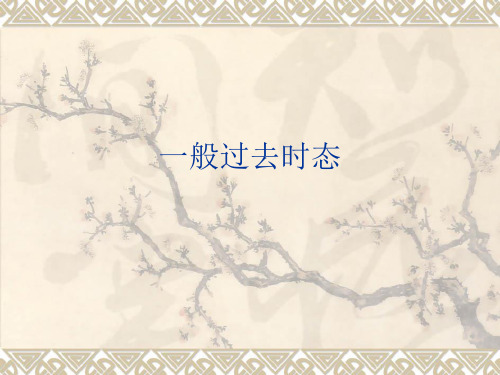
(watch)
❖ 4. They all ____we_n_t ___ to the mountains yesterday
morning. (go)
studied
❖ 5. My friend, Carol, ________for the math test
yesterday evening. (study)
sit---sat
stand---stood take—took
teach—taught
write--wrote
定义
❖ 一般过去时表示过去某个时间发生的动作或 存在的状态,
❖ 常和表示过去的时间状语连用,如yesterday, last night, in 1990, two days ago等。一般过 去时也表示过去经常或反复发生的动作。常 和often, always等表示频度的时间状语连用。
一般过去时态
一构成
❖ 1. 动词的过去时态did, played. ❖ 2. There be 句型的Be动词的变化:was,
were.
动词过去式的变化规则
❖ 动词过去式分为规则变化和不规则变化:
❖ 规则变化:
❖ 1)一般在动词末尾加-ed.
❖ Eg: look--- looked. Start—started.
❖ 2. She buys a dress last week. _______b_u_y_s_--_--_--_- b_o_u_g_h_t _____
❖
3. Did you liked playing football ? _______L_ik_e_d_--_--_--_--_lik_e________
because they were so busy.
初中英语一般过去时教学ppt课件
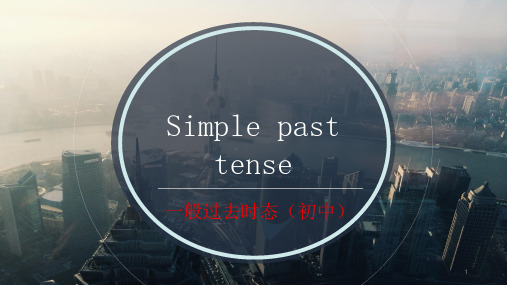
go---went, get---got, buy---bought 等
8
04
常用时间状语
9
常用时间状语
last week tomorrow yesterday often two years ago sometimes at this weekend now usually
疑问词+was/were+主语+其他 Where were you last night?
17
Summary
1. 一般过去时与一般现在时和 一般将来时的区别
2. 一般过去时 定义&结构 3. 动词过去式变形 4. 常用的时间状语 5. 否定句&疑问句形态
18
THANK YOU
19
past present
future
3
02
一般过去时 定义 & 结构
4
一般过去时定义
• 描述在过去的时间里发生的事情 或存在的状态
• Last weekend, I went to the zoo.
5
一般过去时结构
主语+动词过去式+其他+(时间状语) 例句:He read a book sterday • last night/ week/ month/ year/ weekend/ Monday…… • 数字 + day(s) / week(s) / month (s) / year(s) + ago • then (那时)
11
一般现在时 & 一般过去式转换
6
初中英语知识点总结一般过去时

初中英语知识点总结一般过去时一、一般过去时的用法:一般过去时表示过去发生或完成的动作、存在的状态或做过的事情。
1.表示过去一些时间发生的动作或存在的状态:- I played soccer yesterday.(我昨天踢足球。
)- He lived in Beijing when he was young.(他年轻时住在北京。
)2.表示过去的习惯性动作或经常发生的动作:- When I was a child, I always went to bed early.(我小的时候总是早睡。
)3.表示过去的客观事实或真理:- The dinosaurs died out millions of years ago.(恐龙在几百万年前灭绝了。
)- She didn't know the answer to the question.(她不知道问题的答案。
)4.表示过去的心理活动、愿望或打算等:- I wanted to be a doctor when I was young.(我年轻时想做一名医生。
)- He hoped to go to the park with his friends.(他希望和朋友去公园。
)二、一般过去时的构成:1.肯定句式:主语+动词的过去式+其他成分- I played basketball last week.- She lived in London for three years.- They watched a movie at the cinema yesterday.2.否定句式:主语 + did not / didn't + 动词原形 + 其他成分- I didn't play basketball last week.- She didn't live in London for three years.- They didn't watch a movie at the cinema yesterday.3.疑问句式:Did + 主语 + 动词原形 + 其他成分?- Did you play basketball last week?- Did she live in London for three years?- Did they watch a movie at the cinema yesterday?三、一般过去时的特殊情况:1.动词过去式的构成规则:a) 一般情况下,动词的过去式在词尾加上-ed:walk - walked(走)talk - talked(说话)play - played(玩)b)以字母e结尾的动词,在词尾只加-d:dance - danced(跳舞)c) 以辅音字母+y结尾的动词,将y变为i,再加-ed:study - studied(学习)d) 以重读闭音节结尾,末尾只有一个辅音字母的动词,双写这个辅音字母,再加-ed:stop - stopped(停止)plan - planned(计划)2.部分动词的过去式不规则,需要记忆:be - was / were(是)have - had(有)go - went(去)do - did(做)write - wrote(写)see - saw(看见)eat - ate(吃)drink - drank(喝)take - took(拿)四、表示一般过去时的时间状语:1.表示过去一些时间的状语:yesterday(昨天)last week(上星期)two days ago(两天前)2.表示过去的时间段的状语:when I was young(我年轻时)in my childhood(在我童年时)in the past(在过去)3.表示过去曾经做过的动作的状语:once(一次)五、注意事项:1. 一般过去时的句子中,谓语动词要用过去式,但be动词有时会用was或were。
初中英语一般过去时语法讲解

III.一般过去时1.一般过去时表示过去某个时间里发生的动作或状态;过去习惯性、经常性的动作、行为;过去主语所具备的能力和性格。
2.一般过去时,表示过去某个时间里发生的非持续性动作或存在的状态,也表示经常或反复发生的动作。
3.动词的变化1).直接加ed:work——worked look——looked talked visited2).以不发音e结尾的单词,直接加d:live ——lived hope——hoped use——used arrived3).以辅音字母+y结尾的,变y为i加ed:study——studied carry——carried worry——worried4).以重读闭音节结尾的,双写最后的辅音字母+ed:stop——stopped plan——plannedShop--shopped读音:清辅音后读/t/,浊辅音读/d/,在/t/和/d/后读/id/.5). 不规则变化的动词过去式:have---had are---were get---got say---said feel---felt do/does---did is---wasgo---wentdrink--drank eat--ate bring----brought think----thought buy----bought catch---- caught teach ---- taught sit----sat wear----wore cut----cut sweep----swept sleep——slept become----became4.常跟过去时间状语连用yesterday (morning,afternoon,evening)the day before yesterdaylast night (week,Sunday,weekend,month,winter,year,century 世纪)a year agothis morning/afternoon/eveningwhen引导的状语从句(动词过去时)just nowthe other day -- a few days ago.at the age of 10 (过去年龄段)in the old daysat that timeat that moment在那一刻例如:Li Ming did the dishes just now.She took the Subway to school this morning.My grandpa was dead last year.二、句法结构基本结构:主语+谓语(动词过去式)+句子其他成分;主语+was/were+形容词/名词/介词短语+过去时间;否定形式①was/were+not;②在行为动词前加didn't,同时还原行为动词;一般疑问句Did+主语+do+其他1、肯定形式主语+动词过去式+其他例句:She often came to help us in those days.2、否定形式①was/were+not;②在行为动词前加didn't,同时还原行为动词例句:I didn't know you like coffee.3、一般疑问句①Did+主语+谓语动词原型+其他?②Was\Were+主语+表语?例句:Did +任何人称+do homework?肯定回答:Yes,代词+did.No,代词+didn’t三、口诀一般过去时并不难,过去动作、状态记心间。
初中英语语法一般过去时
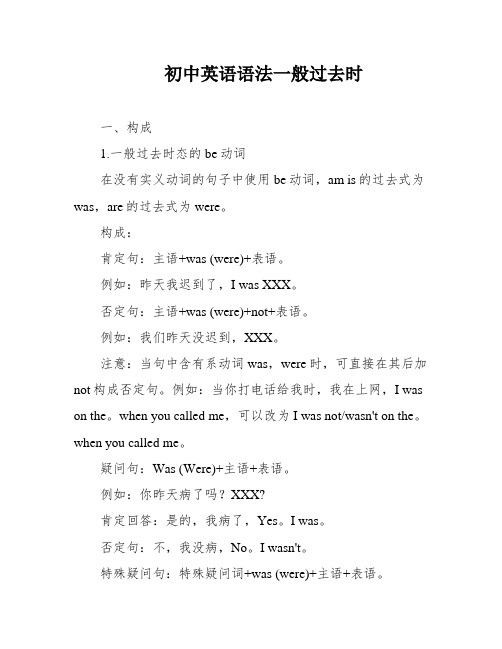
初中英语语法一般过去时一、构成1.一般过去时态的be动词在没有实义动词的句子中使用be动词,am is的过去式为was,are的过去式为were。
构成:肯定句:主语+was (were)+表语。
例如:昨天我迟到了,I was XXX。
否定句:主语+was (were)+not+表语。
例如:我们昨天没迟到,XXX。
注意:当句中含有系动词was,were时,可直接在其后加not构成否定句。
例如:当你打电话给我时,我在上网,I was on the。
when you called me,可以改为I was not/wasn't on the。
when you called me。
疑问句:Was (Were)+主语+表语。
例如:你昨天病了吗?XXX?肯定回答:是的,我病了,Yes。
I was。
否定句:不,我没病,No。
I wasn't。
特殊疑问句:特殊疑问词+was (were)+主语+表语。
例如:你是什么时候出生的?When were you born?2.实义动词的一般过去时态肯定句要使用动词的过去式,否定句和疑问句要使用助动词do和does的过去式did。
构成:肯定句:主语+动词过去式+宾语。
例如:我昨天九点钟回的家,I went home at nine o'clock XXX。
否定句:主语+didn't+动词原形+宾语。
例如:我昨天没回家,I XXX't go home XXX。
疑问句:Did+主语+动词原形+宾语。
例如:你昨天回家了吗?Did you go home yesterday?肯定回答:是的,我回了,Yes。
I did。
否定回答:不,我没回家,No。
I XXX't。
3.助动词和情态动词过去式shall―should(将要)用于第一人称单数;will―would(将要)用于所有人称;can—could(能,会);may―might (可以);must―must(必须);have to―had to(不得不)。
初中英语一般过去时详解及练习题

一般过去时1.一般过去时表示在过去某一时间发生的动作或存在的状态表示时间的词有:yesterday,this morning/afternoon/evening,last+时间(上个...)last night,last Sunday,last week,last year2.一般过去时的基本结构肯定句式①主语+was/were+其他例句:He was here yesterday.②主语+动词过去式+其他例句:I went to play basketball last Sunday.否定句式①主语+was/were+not+其他例句:She wasn’t at home this morning.②主语+didn’t+动词原形+其他例句:I didn’t find you yesterday..一般疑问句①Was/Were+主语+其他例句:Were you at school last week?②Did+主语+动词原形+其他例句:Did you play football yesterday?特殊疑问句特殊疑问词(如what,why,when,where等)+一般疑问句句式例句:Where were you yesterday?What did you do yesterday?3.动词的过去式规则动词①一般情况下直接在动词后+ed例:work-worked look-looked walk-walked②以e结尾的单词直接+d例:live-lived hope-hoped use-used③以辅音字母+y结尾的,改y为i再+ed例:study-studied carry-carried以元音字母+y,直接+ed例:enjoy-enjoyed play-played⑤以重读、一个辅音字母结尾的闭音节结尾的动词,双写最后的辅音字母+ed例:stop-stopped plan-planned prefer-preferred不规则动词(书本76页表格)动词原形过去式动词原形过去式is/am was do didare were get gotbegin began go wentbuy bought have hadcome came make maderead read see sawrun ran take tookeat ate一般过去时练习题一、写出下列动词的过去式1.is/am_____2.fly_____3.plant_____4.are_____5.drink_____6.play_____7.go_____8.make_____9.do_____10.dance_____11.worry_____12.ask_____13.eat_____14.pass_____二、用所给动词的适当形式填空1.He_____(be)at home last night.2.He_____(visit)the Great Wall last year.3.We_____(have)a good time yesterday.4.We_____(go)to school by bus last year.5.Sam_____(did)the housework yesterday.6._____(do)you______(play)the violin this morning?三、选择题1.The two girls____all in Class1last year.A.areB.wasC.were.D is2.This morning he____a taxi.A.tookB.takesC.take.D is taking3.I_____to school at8o’clock yesterday.A.goB.am goingC.went D goes4.-What did you do last night?-I______a story bookA.readB.readedC.am reading D reads。
初中英语知识点一般过去时
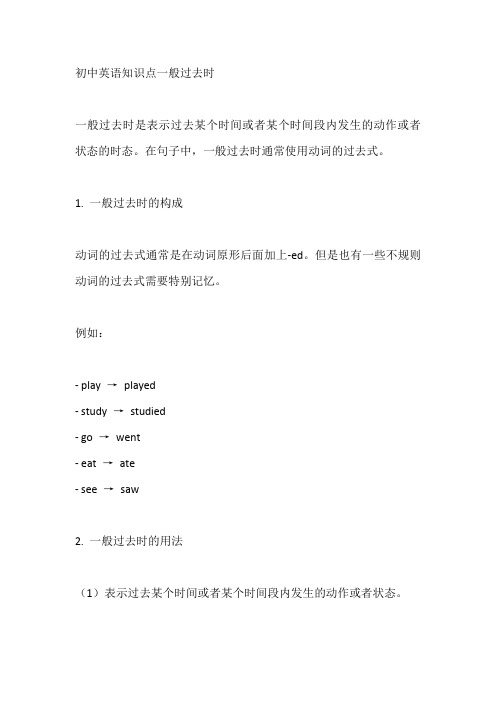
初中英语知识点一般过去时一般过去时是表示过去某个时间或者某个时间段内发生的动作或者状态的时态。
在句子中,一般过去时通常使用动词的过去式。
1. 一般过去时的构成动词的过去式通常是在动词原形后面加上-ed。
但是也有一些不规则动词的过去式需要特别记忆。
例如:- play →played- study →studied- go →went- eat →ate- see →saw2. 一般过去时的用法(1)表示过去某个时间或者某个时间段内发生的动作或者状态。
例如:- I watched a movie yesterday.(我昨天看了一部电影。
)- She lived in New York for three years.(她在纽约住了三年。
)(2)表示过去的习惯或者经常性的动作。
例如:- When I was young, I played soccer every day.(我小时候每天都踢足球。
)- He always ate breakfast at 7:00 am.(他总是在早上7点吃早餐。
)(3)表示过去的真实条件。
例如:- If it rained, we stayed inside.(如果下雨了,我们就呆在屋里。
)(4)表示过去的虚拟条件。
例如:- If I had more money, I would buy a new car.(如果我有更多的钱,我会买一辆新车。
)3. 一般过去时的时间状语一般过去时常常和表示过去时间的时间状语连用,例如:- yesterday(昨天)- last week(上周)- two years ago(两年前)- in 1999(在1999年)- at that time(那个时候)以上就是初中英语知识点:一般过去时的介绍。
希望对大家有所帮助。
初中英语知识点归纳一般过去时的用法
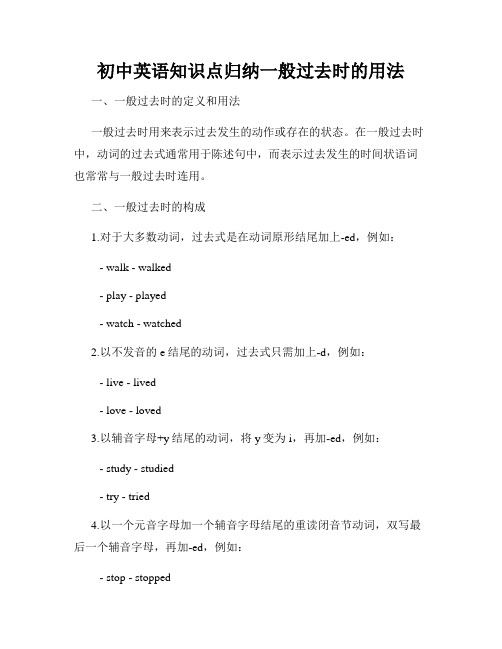
初中英语知识点归纳一般过去时的用法一、一般过去时的定义和用法一般过去时用来表示过去发生的动作或存在的状态。
在一般过去时中,动词的过去式通常用于陈述句中,而表示过去发生的时间状语词也常常与一般过去时连用。
二、一般过去时的构成1.对于大多数动词,过去式是在动词原形结尾加上-ed,例如:- walk - walked- play - played- watch - watched2.以不发音的e结尾的动词,过去式只需加上-d,例如:- live - lived- love - loved3.以辅音字母+y结尾的动词,将y变为i,再加-ed,例如:- study - studied- try - tried4.以一个元音字母加一个辅音字母结尾的重读闭音节动词,双写最后一个辅音字母,再加-ed,例如:- stop - stopped- plan - planned注意:有些动词的过去式形式与原形一样,例如:- put - put- cut - cut三、一般过去时的用法1.表示过去某个时间发生的动作或事件,例如:- I went to the park yesterday.- They finished their homework last night.2.表示过去存在的状态,例如:- She was a nice girl when she was young.- It was sunny yesterday.3.表示过去的习惯或经常性动作,例如:- When I was young, I played basketball every day.- They often went fishing on weekends.4.在宾语从句中,当主句是过去时,宾语从句的动词也要用一般过去时,例如:- He said that he watched a movie last night.- She told me that she visited her grandparents on the weekend.5.与表示过去具体时间的状语连用,例如:- I saw him two days ago.- We had a great time at the party last week.四、一般过去时的注意事项1.注意动词的变化形式,特别是不规则动词的过去式,需要进行记忆和练习。
初中英语一般过去时课件(PPT)
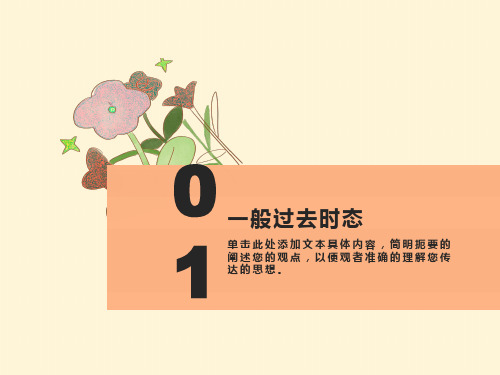
I ____ 11 years old last year.
他现在在北京。
I ___ 12 years old this year.
我今年12岁.
他们今天在中国。
They ____ in China today.
They ____ in Japan yesterday.
他们昨天在日本。
Do you go to school on foot every day? ___ you __ to school on foot yesterday.
Does he go to school by bus every day? ___ he ___to school by bus yesterday?
动词原形、第三人称单数
动词过去式
got
played
They don’t watch TV in the evening. They _________ TV last night.
She doesn’t play basketball after school. She _________ basketball after school yesterday.
常用时间
与ago 连用: a moment two minutes three hours five days one week six months four years
01
ago
02
用于一般过去时的时间状语
last
time night week month year Monday
yesterday
____ they _____ their work at four? Yes, they _____. No, they _____.
初中英语语法一般过去时

初中英语一般过去时知识讲解与训练第一部分:知识讲解1.一般过去时表示过去某个时间发生的动作或存在的状态,常和表示过去的时间状语连用。
一般过去时也表示过去经常或反复发生的动作。
2.Be动词在一般过去时中的变化:⑴am 和is在一般过去时中变为was。
(was not=wasn’t)⑵are在一般过去时中变为were。
(were not=weren’t)⑶带有was或were的句子,其否定、疑问的变化和is, am, are一样,即否定句在was或were后加not,一般疑问句把was或were放到句首。
3.句中没有be动词的一般过去时的句子否定句:didn’t +动词原形,如:Jim didn’t go home yesterday.一般疑问句:在句首加did,句子中的动词过去式变回原形。
如:Did Jim go home yesterday?特殊疑问句:⑴疑问词+did+主语+动词原形?如:What did Jim do yesterday?⑵疑问词当主语时:疑问词+动词过去式?如:Who went to home yesterday?动词过去式变化规则:1.一般在动词末尾加-ed,如:pull-pulled, cook-cooked2.结尾是e加d,如:taste-tasted3.末尾只有一个元音字母和一个辅音字母的重读闭音节,应双写末尾的辅音字母,再加-ed,如:stop-stopped 4.以“辅音字母+y”结尾的,变y为i,再加-ed,如:study-studied5.不规则动词过去式:强化训练:一、将下列动词变成过去式。
look_______ watch_______ like______ hope______decide______ plan______ stop_______ carry______study______ play______ stay______ let______put_______ read_______ catch _____ teach_____buy______ bring______ think ______ sit_____write______ drive_______ ring______ sink______run______ give_______ win _______ know ______grow______ throw_______ draw _____ show_____feel______ sleep_______ keep_____ sweep_____二、选择填空。
初中英语知识点总结一般过去时
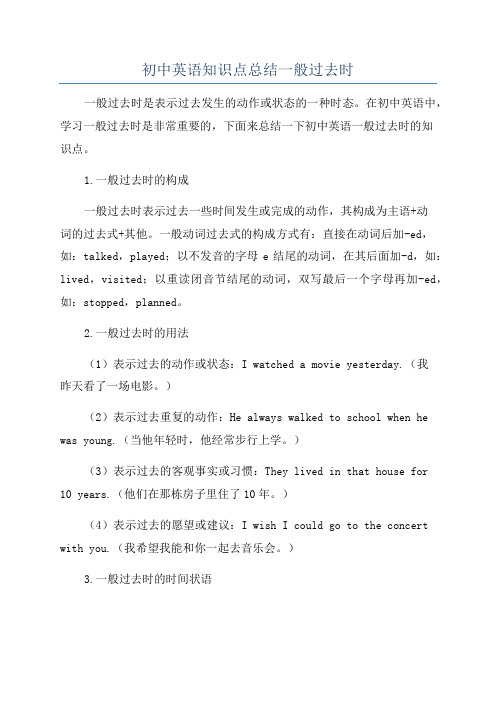
初中英语知识点总结一般过去时一般过去时是表示过去发生的动作或状态的一种时态。
在初中英语中,学习一般过去时是非常重要的,下面来总结一下初中英语一般过去时的知识点。
1.一般过去时的构成一般过去时表示过去一些时间发生或完成的动作,其构成为主语+动词的过去式+其他。
一般动词过去式的构成方式有:直接在动词后加-ed,如:talked,played;以不发音的字母e结尾的动词,在其后面加-d,如:lived,visited;以重读闭音节结尾的动词,双写最后一个字母再加-ed,如:stopped,planned。
2.一般过去时的用法(1)表示过去的动作或状态:I watched a movie yesterday.(我昨天看了一场电影。
)(2)表示过去重复的动作:He always walked to school when he was young.(当他年轻时,他经常步行上学。
)(3)表示过去的客观事实或习惯:They lived in that house for 10 years.(他们在那栋房子里住了10年。
)(4)表示过去的愿望或建议:I wish I could go to the concert with you.(我希望我能和你一起去音乐会。
)3.一般过去时的时间状语一般过去时常常与表示过去的时间状语连用,如:yesterday(昨天)、last week(上周)、in 1990(在1990年)、two days ago(两天前)等。
这些时间状语可以帮助我们明确动作发生的具体时间。
4.一般过去时的否定和疑问句(1)否定句的构成为:主语+did not/didn't+动词原形+其他。
如:I didn't go to the party last night.(我昨晚没去参加派对。
)(2)一般疑问句的构成为:Did+主语+动词原形+其他?如:Did you see the movie yesterday?(你昨天看电影了吗?)回答时,可以用Yes,I did.或No,I didn't.来回答。
初中英语中考高频考点一般过去时详细讲解
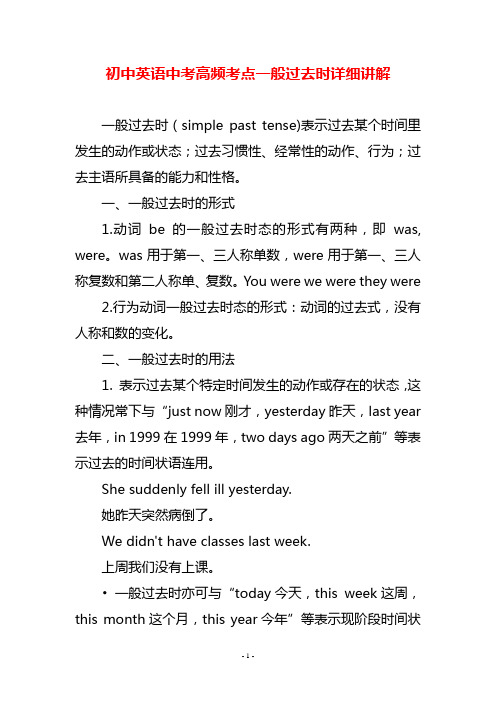
初中英语中考高频考点一般过去时详细讲解一般过去时(simple past tense)表示过去某个时间里发生的动作或状态;过去习惯性、经常性的动作、行为;过去主语所具备的能力和性格。
一、一般过去时的形式1.动词be的一般过去时态的形式有两种,即was, were。
was用于第一、三人称单数,were用于第一、三人称复数和第二人称单、复数。
You were we were they were2.行为动词一般过去时态的形式:动词的过去式,没有人称和数的变化。
二、一般过去时的用法1. 表示过去某个特定时间发生的动作或存在的状态,这种情况常下与“just now刚才,yesterday昨天,last year 去年,in 1999在1999年,two days ago两天之前”等表示过去的时间状语连用。
She suddenly fell ill yesterday.她昨天突然病倒了。
We didn't have classes last week.上周我们没有上课。
•一般过去时亦可与“today今天,this week这周,this month这个月,this year今年”等表示现阶段时间状语连用。
如:Did you meet him today?今天你看见他了吗?2. 表示过去的习惯性或经常发生的动作一般过去时表示过去经常或反复发生的动作,常和“often经常,always总是,once a week一周一次”等表示频度的时间状语连用。
I went to the cinema once a week when I was at school.我上学时每周去看一场电影。
When I was in the countryside, I often walked by the riverside.我在乡下时经常在河边散步。
•表示过去一段时间内经常或反复发生的动作,也可以用would+动词原形或用used to加动词原形:When he was young, he would go skating every winter.他年轻时每年冬天都要去滑冰。
- 1、下载文档前请自行甄别文档内容的完整性,平台不提供额外的编辑、内容补充、找答案等附加服务。
- 2、"仅部分预览"的文档,不可在线预览部分如存在完整性等问题,可反馈申请退款(可完整预览的文档不适用该条件!)。
- 3、如文档侵犯您的权益,请联系客服反馈,我们会尽快为您处理(人工客服工作时间:9:00-18:30)。
初中英语一般过去时一般过去时专练I.请用正确动词形式填空1. He (live) in Wuxi two years ago.2. The cat (eat) a bird last night.3. We (have) a party last Halloween.4. Nancy (pick) up oranges on the farm last week.5. I (make) a model ship with Mike yesterday.6. They (play) chess in the classroom last PE lesson.7. My mother (cook) a nice food last Spring Festival.8. The girls (dance) at the party last night.9. I (watch) a cartoon on Saturday last week.10. ______ you _______ (visit) your relatives last Spring Festival?11. ______ he _______ (fly) a kite on Sunday? Yes, he ______.12. Gao Shan _______ (put) up the picture last night.13. I ____________ (sweep) the floor yesterday.14. What ______ she _______ (find) in the garden last morning?15. Her father _______ (read) a newspaper last night.16. Mike _________________(not go) to bed until 12 o’clock last night.17. I listened but ___________ (hear) nothing.18. How many people ________ (be) there in your class last term? II. 改错题1(How is Jane yesterday? _____________________2(He go to school by bus last week. ____________________________3.He often goes home at 6:00 last month. ____________________________4(I can fly kites seven years ago. ______________________________ 5.Did you saw him just now. ____________________________________ 三、按要求变换句型。
1. Frank read an interesting book about history. (一般疑问句)_______ Frank _______ an interesting book about history? 2. He cleaned his room just now.. (划线提问)What________ he _______?3. Thomas spent RMB 10 on this book. (否定句)Thomas _______ _______ RMB 10 on this book.4. My family went to the beach last week. (划线提问)________ ________ ________ family _______ last week?四. 完成句子1) He likes _____( 学习) music.2) He can speak _____ ( 汉语 ) very well.3) My hobby is _____(唱歌 ) and _____(跳舞 ).4) I can read ____( 而且) write.5) He is _____( 吃 ) bread for his breakfast.6) He _____ (跳舞 ) at the party last week and ___( 唱歌) an English song .7) My father often ____(划船 ) boats with us on Sundays.8) He is showing us his birthday ____(礼物), it’s really lovely.9) He likes __________(滑冰 ) a lot.10) An ________( 大象 ) is much bigger than an ant.五、完成句子.1. 我们去年春天照了许多相. We _________ many ____last _____.2. 我们昨天乘车去了广州. We ____a bus _____Guangzhou. 3. 你吃了好东西吗? Didyou ____ _____ _____?4. 我昨天在花园里看见了嫩芽. I ____ _____ in the garden yesterday.5. 上周我们去爬山了. We _____ a ______last ______.6. 我的爱好是划船. My______is ______a_________.7. 我去年冬天和Sarah 去滑雪. Sarah and I ___ ______ last winter. 8.你度假期是为我买了邮票吗? Did you ______ ______for me? 9. 爸爸上周二为他买了一个风筝. Dad _____a kite for ____last _____ 10. 他每晚在家学英语.He _____ _____ at home every evening.六、完成下列问句。
1)你想知道Mike 假期去了哪里, 你说:____ did you _____on you holiday?2)你想知道Mike 假期做什么,你问:_____did you ___on your holiday.3)你想知道Mike 怎么到北京,你问:_____did you ____to Beijing.4)你想知道Mike 假期打算做什么, 你问:_____are you ____on your holiday?5)你想知道M 假期打算去哪里, 你说: _____are you going to _____ onyour holiday?6)你想知道Mike 假期打算怎么到北京,你问: ____ are you ____to Beijing.7)你想知道Mike 假期经常去哪里,你说:______do you _____on your holiday?8)你想知道Mike 假期经常做什么,你问:_____do you _____on your holiday?9)你想知道Mike 怎么到北京,你问:_____do you ____to Beijing?10)你想Mike 是怎么啦?_____the _____with Mike?七、选择填空。
(15分)( ) 1、My father __________football every week.A. playedB. playsC. playing ( ) 2、I played basketball in the playground __________ weekend.A. lastB. nextC. this ( ) 3、My grandparents __________ in the evenings.A. watchesB. watch TVC. watched TV ( ) 4、Did Rose __________ last Sunday?A. went swimmingB. read a bookC. taking pictures( ) 5、Tom __________ very happy last night..A. looksB. isC. was ( ) 6、Three days __________ , I will be back to Shunde.A. beforeB. laterC. soon ( ) 7、__________ the second day , I rowed a boat in the river.A. InB. OnC. At( ) 8. __________ was your last trip? Last weekend.A. WhenB. WhereC. How( ) 9、What __________ you __________ for the last day of the holiday?A. do, doB. did, doC. do, did( ) 10、It was a long holiday. They_____ Shanghai on Mar. 2nd and______ to Harbin on the 3rd.A. leave, gotB. left , getC. left, got ( ) 11、She __________ homework last night.A. doesn’t , doB. don’t ,didC. didn’t ,do( ) 12、He has nothing to do. He is __________.A. tiredB. angryC. bored( ) 13. What did you do __________ your holiday ?A. inB. onC. at( ) 14. He __________ in the river last week.A. swamB. swimsC. swum( ) 15. --Can you __________? -- Yes, I __________ last night.A. dance, dancedB. dances, danceC. danced ,danced。
